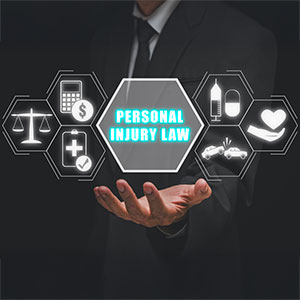Glossary of Terms
Personal Injury and Medical Malpractice Terms For Plaintiffs
The following terms are commonly used in personal injury and medical malpractice cases in Florida. If you are a plaintiff in a personal injury or medical malpractice case, knowing these terms will be helpful in understanding the process and what the attorneys are doing on your case.
AnswerWhen a defendant responds to a plaintiff’s complaint (the document that begins the lawsuit), it is called an answer. The answer may admit some of the plaintiff’s allegations but will usually deny most or all of the plaintiff’s allegations.
Assignment of benefits (or assignment of rights)
An assignment of benefits or assignment of rights is a document that a patient signs when they go to a hospital or doctor’s office that authorizes the hospital or physician to bill that patient’s insurance directly. The assignment also allows the medical provider to sue the insurance company responsible for providing medical benefits. An assignment of benefits or rights, however, does not authorize the medical provider to sue the person who caused the accident or injury. Instead, it only allows them to bill and get paid for medical treatment.
Attorney-Client privilege
When a client communicates with their attorney, the communications are considered privileged. This means that the client cannot normally be compelled to disclose what was said. Further, the attorney cannot divulge what was said without permission. However, you should be careful when speaking to your attorney in the presence of third parties as that will normally waive the privilege.
Bad faith
An insurance company in Florida has an obligation to act fairly and honestly toward its insured. The failure to do so is considered bad faith.
Code blue
A code blue is a medical term used to describe when a patient becomes unresponsive and requires immediate life saving care.
Collateral source (or collateral source rule)
The collateral source rule in Florida functions in two ways. First, it prevents evidence at trial that a plaintiff has health insurance or some other way to pay for medical expenses after an accident. PIP/no-fault is not considered a collateral source. Second, the rule requires a set off from the jury verdict of all amounts that the plaintiff is not legally required to pay. If a medical bill was $10,000 and insurance (a collateral source of indemnity) pays $4,000 to satisfy the bill with the rest written off, then $6,000 is set off (or subtracted) from the jury verdict.
Complaint
This is the document that begins a lawsuit and is filed by the plaintiff. It sets out the conduct that created a legal liability along with facts that support it.
Compulsory Medical Examination (CME)
After a lawsuit is filed, the defense can ask that the plaintiff submit to an examination by a doctor. This is called a CME. At trial, the defense will usually call the CME doctor as a witness against the plaintiff and say that the plaintiff’s injuries were pre-existing, were not caused by the incident sued upon, or have healed with no permanent symptoms.
Coverage Dispute
A coverage dispute is when the insurance company denies coverage for a claim. When a lawsuit is filed to resolve a coverage dispute, a plaintiff is entitled to attorney fees and costs pursuant to section 627.428, Fla. Stat. for a wrongful denial of insurance coverage.
Counteroffer
A counteroffer is when a party rejects the terms offered by the other party and makes it own offer in response.
Declaratory action (or declaratory relief)
A declaratory action (or “dec” action for short) is when the insurance company files a lawsuit to ask a judge to declare that their insurance policy does not provide coverage for an accident. While a declaratory action can be filed by either a claimant or the insurance company, it is usually the insurance company who will file the declaratory action because they are the ones seeking to get out of responsibility for the case. In general terms, a declaratory action is simply a lawsuit to resolve a question over what the language of a contract or other document says in legal terms.
Defend, duty to
An insurance company has a contractual duty to defend all claims brought against an insured that might result in a judgment against the insured for which the insured will be legally responsible to pay. The duty to defend a lawsuit is broader than the duty to indemnify (or pay) because an insurance company is required to defend all claims brought against an insured when there is at least one claim that is potentially covered by the duty to indemnify.
Demand letter
A demand letter is a letter sent to an insurance company that seeks payment of a settlement and threatens a lawsuit if payment is not made.
Deposition
A deposition is when a person is required to answer questions verbally in front of a court report under oath of penalty of perjury.
Directed Verdict
A directed verdict is when the judge finds that a party is entitled to judgment as a matter of law. For example, in a case in which the defendant admits liability, it is appropriate for the judge to enter a directed verdict on past medical expenses (unless they are being challenged as not reasonable and necessary or are unrelated to the accident).
Global Settlement
The word “global” as used in personal injury refers to inviting everyone who has a claim. For instance, a “global” settlement conference would include everyone who has a right to sue the person who caused an accident.
Good Samaritan
A Good Samaritan is someone who provides medical care for free and is thereafter granted limited immunity from liability except when there is conduct that demonstrates a reckless disregard for life or the consequences thereof.
Impeachment
Impeachment is when a person’s testimony is directly contradicted with prior inconsistent testimony or facts that are inconsistent with their current testimony.
Indemnify, duty to
An insurance company is required to pay any damages that an insured becomes legally responsible to pay for within the scope of the insurance policy. For example, if an insurance policy insures someone for bodily injury liability, then the insurance company has to pay all damages that the insured becomes responsible to pay for by reason of a personal injury (up to the policy limits).
Independent Medical Examination (IME)
An IME is an examination by a doctor for Personal-Injury-Protection (PIP or no-fault) insurance. The purpose of this examination is usually to cut the plaintiff off from benefits. In this examination, a doctor hired by the insurance company will usually make a finding that no further medical treatment is reasonable or necessary after a car accident.
An insured is someone who is covered by an insurance policy and is entitled to either indemnity or a defense.
Intentional tort
An intentional tort is based on conduct that was intentional as opposed to negligent. An example of an intentional tort would be battery. Under most insurance policies, there is no coverage for an intentional tort, however, the person who commits an intentional tort is still legally responsible to pay damages and is subject to civil judgment by a lawsuit.
Interrogatory
Interrogatories are written questions that are sent to parties in a lawsuit. These written questions are answered under oath and penalty of perjury. After your attorney receives interrogatories from the other party, there is a 30 day deadline to respond.
Letter of protection (LOP)
A letter of protection (or LOP) is a promise to pay someone out of the money recovered on your personal injury case. The most frequent of use of an LOP is where a doctor agrees to forego billing you for medical care until the end of your case when there is no insurance to pay medical bills (the only source of recovery is the lawsuit itself). An LOP helps people without insurance (or where insurance has been exhausted) obtain much needed medical care for their case. There are rare instances where a person other than a doctor gets a letter of protection on a personal injury case.
Maximum medical improvement (MMI)
A patient is at MMI when a patient is no longer healing from an injury. Once a patient reaches MMI, they are as good as they are going to get and should only expect to receive palliative (or “feel good”) care in the future.
Mediation
A mediation is a meeting between the parties and a “neutral” third party who attempts to get the parties to agree to a settlement. In virtually all personal injury and medical malpractice cases, you will be court ordered to go to a mediation even if you know there is little or no hope of settlement.
Notice of intent
The phrase “notice of intent” generally refers to the pre-suit notice letter that is required in Florida medical malpractice cases. Attached to a medical malpractice pre-suit notice of intent letter, you will find medical records, affidavits from experts, and a medical authorization.
Objection
An objection is a response to a deposition question or discovery request that seeks to preserve a right to prevent the answer from going into evidence should the case go to trial. An objection does not necessarily mean that the question does not have to be answered. The answer to the question must be privileged in order to be avoided.
Premises liability
A premises liability case is one that involves a dangerous condition on the property, typically involving a slip and fall or trip and fall.
Privilege
When something is privileged, it is not discoverable and cannot be compelled. There are several privileges (i.e. attorney-client privilege) under Florida law and they can be waived, sometimes inadvertently, by certain actions or failures to preserve them.
Proposal for settlement (or offer of judgment)
A proposal for settlement is an offer to settle a case that is formally filed with the court. Under the rules of civil procedure (and statute), a party has 30 days to accept a proposal for settlement before it expires. Once the proposal for settlement expires, there is the potential that the party rejecting the proposal must pay the other party’s attorney fees and costs. Ordinarily in a personal injury or medical malpractice case, there is no right to attorney fees. The penalty for failure to accept a proposal for settlement is triggered by a verdict that is 25% less than what was offered.
Proximate cause
This means the legal cause of an accident or injury. In order to be regarded as a proximate cause, the action must be within the “chain of causation” that is reasonably expected to occur from an event. An intervening or superseding cause will break the chain of causation for which the defendant is no longer legally responsible.
Reckless disregard
Reckless disregard is the legal standard applicable to emergency personnel and physicians who provide medical treatment under emergency circumstances upon admission to an emergency room at a hospital. This standard of liability provides those persons with limited immunity to the extent that their actions or inactions were almost intentional. There is some legal confusion over what this standard really is.
Reimbursement
This refers to an insurance company’s right to be repaid for benefits that have been extended for an insured after a settlement or a judgment has been recovered. Prior to settlement or judgment, it is called subrogation.
Reply
A plaintiff is not required to file a response to a defendant’s answer in a lawsuit. However, if the plaintiff does file a response after the defendant answers the lawsuit, it is called a reply. A reply will typically deny or avoid affirmative defenses asserted by the defendant in a lawsuit. Failure to file a reply generally serves a denial of all affirmative defenses, except for ones which must be specifically avoided.
Request for admission
After a lawsuit is filed, a party can ask the other party to admit or deny a specific fact. Failure to respond to a request for admission functions as an admission of the fact requested. There is a general 30 day deadline to respond to a request for admission.
Request to produce (or request for production)
After a lawsuit is filed, a party can ask the other party to produce documents that are in that party’s possession. A party responding to a request to produce can comply by providing a copy of the document requested or, if not in possession, then stating so. There is a general 30 day deadline to respond to a request to produce. A request for entry upon land or inspection is covered under the same rule of procedure.
Reservation of rights
A reservation of rights is when an insurance company is unsure of whether they are going to provide coverage. Rather than risk bad faith for a failure to defend, an insurance company will provide a defense under a reservation of rights. This means that the insurance company can decide at a later date and time whether afford a defense.
Respondeat superior
This is a Latin term that refers to an employer being vicariously liable for the negligence of an employee.
Sanctions
Sanctions are a penalty for failure to comply with discovery or a court order.
Set off
Under Florida’s collateral source rule, any amount of medical bills that the plaintiff is not required to pay gets subtracted (or set off) from a jury verdict. A set off is also taken into consideration when calculating a case’s settlement value.
Stacking
When buying uninsured or underinsured motorist’s coverage (UM or UIM) in Florida, you have the option to purchase stacking. Stacking takes your UM limit and multiplies (stacks) it by the number of vehicles you have on your automobile insurance policy. If you have a $100,000 per person/$300,000 per accident UM policy limit with stacking and two vehicles, then the total UM limits available will be $200,000 per person and $600,000 per accident.
Statute of limitations
The statute of limitation in a Florida personal injury or medical malpractice case is the deadline upon which a lawsuit must be filed or else the right to sue expires. Statutes of limitation can found in Chapter 95, Florida Statutes and are called “limitations of actions.” In Florida, there is a general 4 year statute of limitation to file a personal injury action; 2 years to file a medical malpractice action; 2 years to file a wrongful death action; and 5 years to sue on a contract (i.e. UM coverage).
Strict liability
Strict liability refers to a standard of legal liability in which acting reasonably is not a defense. In other words, a defendant who is held responsible under a strict liability standard is held responsible even if they were not negligent.
Standard of care
The standard of care refers to the standard of legal liability in a medical malpractice case. This is defined in section 766.102 as the “prevailing professional standard of care for a given health care provider shall be that level of care, skill, and treatment which, in light of all relevant surrounding circumstances, is recognized as acceptable and appropriate by reasonably prudent similar health care providers.”
Subpoena
A subpoena is a court order (issued by an attorney) to appear in court for testimony or to produce a document.
Subrogation
Subrogation refers to an insurance company’s right to collect the amount of benefits that it has paid from a person who created a legal liability. After a settlement or judgment has been reached, a right of subrogation ceases to exist and is replaced by a right of reimbursement. Despite the legal difference, these terms are frequently used interchangeably without distinction.
Summary Judgment
A summary judgment is when there is no issue of fact remaining as to a legal issue. For instance, when an employer admits that its employee was in the course and scope of employment when a negligent act was committed, summary judgment is appropriate to find that the employer is vicariously liable for the actions of the employee (note that the employer and employee can still deny that the act was negligent).
Summons
A summons is a command to respond to the jurisdiction of the court. A summons is served by a certified process server on the defendant along with a copy of the lawsuit. After a defendant has been served with a summons, there is a 20 day time limit to file an answer.
Tort
A tort is a civil wrong for which a plaintiff can sue a defendant for damages. A tort exists when one person has a legal duty and breaches that duty. By analogy, a crime is a wrong against society.
Vicarious Liability
Vicarious liability is when one person is held legally responsible for the actions of another person. For instance, the owner of a vehicle in Florida can be held vicariously liable for the actions of a driver who the owner lends the vehicle to (dangerous instrumentality doctrine). Also, an employer is vicariously liable for the negligent actions of an employee while in the course and scope of employment (respondeat superior).
Talk To A Lakeland Personal Injury And Medical Malpractice Lawyer
Russo Law is a Lakeland personal injury and medical malpractice law firm that serves plaintiffs exclusively. Please feel free to check out our frequently asked questions or blog pages. If you would like assistance with your case, please feel free to contact us below. We serve clients with Polk County personal injury and medical malpractice cases in Lakeland and Winter Haven.


